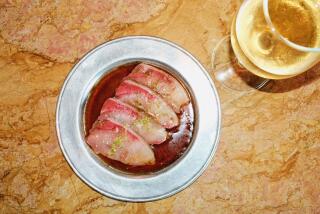Franchises Are Restaurant Owner’s Meal Ticket : Boon-Ja Lee launched a chain of fast food places based on the successful all-Asian-fare concept of her first venture.
ANAHEIM — Doomed to oblivion.
Like many nondescript mom-and-pop operations, that was where Boon-Ja Lee’s Busy Bee fast food restaurant in Buena Park was headed. But 13 years ago, the Korean immigrant slowly began switching the menu from a potpourri of Asian and Western cuisine to serving only popular Chinese, Korean and Japanese dishes, such as Korean barbecue, teriyaki and sweet and sour pork.
“We were not distinctively Asian nor American and we offered regular sandwiches much like many other sandwich places,” said Lee’s 28-year-old son, George, who is Busy Bee’s vice president charged with expanding the franchise.
Recognizing this split identity, Boon-Ja Lee wanted a distinctly all-Asian menu. But few of her customers were ready to try new dishes. To wean them away from chili dogs and hamburgers, she offered a special Korean barbecue sandwich twice weekly. When that became popular, she made it daily fare and introduced teriyaki every few days until her customers--mostly non-Asians--wanted it daily. Other Asian dishes followed.
The transition took a long while, the former registered nurse said, but it was necessary for her to retain her customer base and expand her business. Meanwhile, she attended seminars about franchise management.
Her patience and hard work paid off. By 1987, with two restaurants, she switched to a completely Chinese, Korean and Japanese menu. That year sales were $450,000.
In December, 1990, she launched her franchise business: Busy Bee Franchise Corp. based in Anaheim, which posted sales of $1.5 million last year. Since January, the company has doubled the number of restaurants in Orange County to eight, and in November it plans to open its first Los Angeles eatery. Lee is projecting sales this year of more than $2.5 million.
Lee said her business got a large boost from a change in America’s diet and from trends in the fast food industry.
“In the 1970s, Americans went for steak and seafood. In the 1980s, pizzas and Mexican tacos and burritos were the fad,” she said. “I believe the 1990s is the decade for Asian fast foods, in which health-conscious Americans demand a less expensive, healthy . . . low-cholesterol diet.”
While Americans are generally familiar with Chinese fast food, it was not until recent years that they started to appreciate Japanese and Korean fast food as well. This trend spurred the growth of some Asian restaurant chains, such as Yoshinoya West Inc., the Torrance subsidiary of a Tokyo restaurant chain which operates 55 Yoshinoya Beef Bowl restaurants in Southern California, and Panda Management Co. Inc., a South Pasadena company with more than 60 Panda Express Chinese fast food restaurants nationwide.
Indeed, Lee acknowledges the pioneering efforts of companies like Yoshinoya and Panda Express. But she said she could not have made it without help from her older sister, Hwa-Ja Park, a former cook in a Seoul restaurant, and from Tim Templado, the former director of food services for the El Toro Marine Corps Exchange, where he was in charge of food services and vending operations for both the Tustin and El Toro air bases.
Lee said Park perfected an all-East Asian menu that is simple to prepare, while Templado wrote the administrative and operational training and recipe manuals for the franchisees to mass produce its dishes. He also established a franchisee training program.
“As we saw a change in the marketplace, we changed, too,” George said, including eliminating flavor enhancements such as monosodium glutamate. “We saw a strong need for a food market specializing in various Oriental cuisines for the U.S. market and we filled that void.”
Alongside Chinese egg rolls, fried wanton and beef and broccoli dishes are chicken teriyaki, kim-chi and Korean chicken, and short-rib barbecue. For just $3.99, customers can pick two entrees to go with their fried rice or chow mein. And for another 70 cents, customers can add a third entree.
Busy Bee franchise holders--mostly Korean immigrants--pay $25,000 to open a restaurant. For that, they receive nine weeks of training where they are taught how to efficiently run and maintain the restaurants. A third of the training period is spent in a model restaurant on Beach Boulevard in Anaheim, where the franchisees get to serve actual customers. The franchisees spend the final three weeks opening and receiving help in running their own restaurants in company-approved locations, mostly in shopping malls.
Lee said that in six months, she plans to begin bottling Busy Bee’s teriyaki, lemon chicken and sweet and sour sauces. She also plans to sell chilled egg rolls.
More to Read
Inside the business of entertainment
The Wide Shot brings you news, analysis and insights on everything from streaming wars to production — and what it all means for the future.
You may occasionally receive promotional content from the Los Angeles Times.










